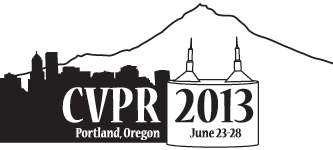-
LGE-KSVD: Flexible Dictionary Learning for Optimized Sparse Representation Classification
AbstractSparse representations have successfully been exploited for the development of highly accurate classifiers. Unfortunately, these classifiers are computationally intensive and subject to the adverse effects of coefficient contamination, where for example variations in pose may affect identity and expression recognition. We propose a technique, called LGE-KSVD, that addresses both problems and attains state-of-the-art results for face and gesture classification problems. Specifically, LGE-KSVD utilizes variants of Linear extension of Graph Embedding to optimize K-SVD, an iterative technique for small yet overcomplete dictionary learning. The dimensionality reduction matrix, sparse representation dictionary, sparse coefficients, and sparsity-based linear classifier are jointly learned through LGE-KSVD. The atom optimization process is redefined to have variable support using graph embedding techniques to produce a more flexible and elegant dictionary learning algorithm. Results are obtained for a wide variety of facial and activity recognition problems to demonstrate the robustness of the proposed method.
Related Material
[pdf][bibtex]@InProceedings{Ptucha_2013_CVPR_Workshops,
author = {Ptucha, Raymond and Savakis, Andreas},
title = {LGE-KSVD: Flexible Dictionary Learning for Optimized Sparse Representation Classification},
booktitle = {Proceedings of the IEEE Conference on Computer Vision and Pattern Recognition (CVPR) Workshops},
month = {June},
year = {2013}
}
These CVPR 2013 workshop papers are the Open Access versions, provided by the Computer Vision Foundation.
Except for the watermark, they are identical to the accepted versions; the final published version of the proceedings is available on IEEE Xplore.
Except for the watermark, they are identical to the accepted versions; the final published version of the proceedings is available on IEEE Xplore.
This material is presented to ensure timely dissemination of scholarly and technical work.
Copyright and all rights therein are retained by authors or by other copyright holders.
All persons copying this information are expected to adhere to the terms and constraints invoked by each author's copyright.

